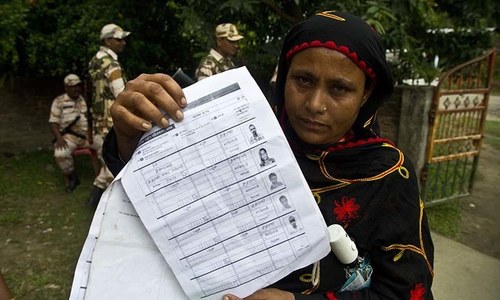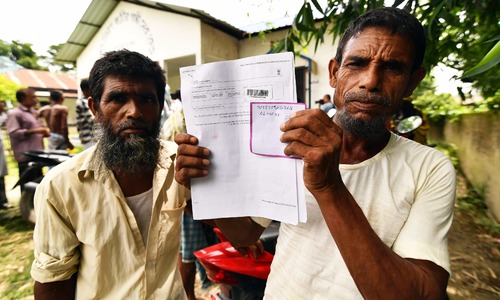THE scale of it is eye-watering: 1.9m people excluded from the final list of the National Register of Citizens in Assam, published by the Indian government on Saturday.
Read: Two million, mostly Muslims, face statelessness as India publishes controversial citizenship list
These are the people — mostly Bengali-speaking Muslims — that have been deemed to be ‘foreigners’ by virtue of being unable to prove that they or their forebears lived or entered India before March 1971, prior to which Bengalis were actively encouraged to migrate to India. Many have been living in Assam for decades, or have known no other home but India.
With the threshold for documentary proof high, and the appeals process long and murky, the process of updating the NRC has been mired in controversy given the BJP’s penchant for stoking anti-Muslim, anti-immigrant sentiment.
Narendra Modi’s home minister has gone as far as to promise that the NRC will be implemented across India, to root out those who he describes as ‘infiltrators’ and has likened to vermin.
Given that discrimination and dehumanisation are often precursors to a potential genocide, it is little wonder that human rights groups are so alarmed. Over 1,100 people are already imprisoned in Assam’s so-called foreigner detention centres. There are fears that mass internment is impending — or worse, such as forced displacements and genocidal massacres.
If the Rohingya crisis of 2017, when hundreds of thousands were stripped of Burmese citizenship and forced to flee Myanmar into Bangladesh, seemed a colossal human tragedy, what may occur in Assam might well be even more unimaginably catastrophic.
Rendering people stateless is an inhumane practice.
If an individual does not legally belong anywhere, then no nation is responsible for ensuring their rights, survival or even existence. While the 1954 UN Convention relating to the Status of Stateless Persons does ensure basic protections, denying individuals a national identity effectively denies them the right to have rights, and states have in fact used the revocation of citizenship as a political tool to punish opponents and critics, and even change demographics. This is why even the handful of cases of Western-born IS fighters and collaborators being stripped of citizenship has been so contentious; though it is important to stress that, here, it is the lives of countless entirely innocent civilians that are at stake.
Rendering people of Bangladeshi-origin stateless — at risk of being alienated, killed or shunted about in internment centres and refugee camps — is an incalculable humanitarian crisis in the making.
India’s move in Assam will undoubtedly strain its ties with Bangladesh — which has shown no indication it will accept these ‘unwanted’ humans — but it is incumbent on both nations to negotiate a reasonable and humane settlement to this brewing crisis. Bangladesh must come to some sort of an agreement with India, and soon, as well as reconsider its policies with regard to the status of the stateless Rohingya seeking refuge within its borders.
Published in Dawn, September 3rd, 2019











































